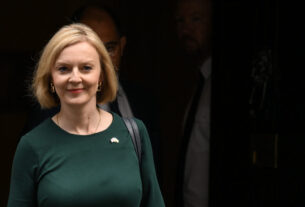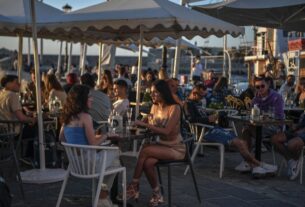EU leaders failed on Thursday to overcome Bulgaria’s objection to North Macedonia joining the bloc, leaving several Western Balkans leaders fuming at how the entire region’s EU aspirations have been stymied as a result.
“I will be straightforward,” a furious North Macedonian Prime Minister Dimitar Kovačevski said as he addressed reporters following the meeting. “What is happening now is a serious problem and a serious blow to the credibility of the European Union.”
There were glimmers of hope that Thursday’s summit of Western Balkans and EU leaders may lead to a compromise between Bulgaria, which has been blocking North Macedonia’s EU accession over a years-long dispute relating to history and language. But it quickly became clear Thursday morning that such hopes would soon be dashed.
After the meeting, which preceded a two-day EU leaders’ summit, Albanian Prime Minister Edi Rama slammed Bulgaria and the whole EU enlargement process.
“Bulgaria is a disgrace, but it’s not simply Bulgaria,” he said. “The reason is the crooked spirit of the enlargement — its totally crooked spirit. Bulgaria is its most stunning expression. The enlargement spirit has gone from a shared vision of an entire community to the kidnapping of individual member states.”
Rama was especially barbed in his remarks. He railed that Bulgaria had rendered the EU “impotent.” He referenced the perpetually-doomed-to-purgatory leads in “Waiting for Godot.”
The Western Balkans’ EU prospects have reentered the spotlight amid Russia’s war in Ukraine, which has prompted Kyiv, as well as nearby Moldova and Georgia, to apply for EU membership. On Thursday, EU leaders will anoint Ukraine and Moldova as official candidates, moving with an alacrity that has reinforced just how long other EU candidates have been waiting in the wings.
In the Western Balkans, North Macedonia has been an EU candidate since 2005. Serbia then got the designation in 2012 and Albania joined them in 2014. The waiting game has left leaders in the region grumbling.
“My country North Macedonia and the Republic of Albania, but also the region, we can’t be stuck in this situation because a single country simply fails to coordinate and ensure the unblocking of a European path for us,” Kovačevski said.
In a last-ditch effort to make progress heading into Thursday, the French EU presidency came up last week with a proposal to break the impasse.
But the plan was a no-go for North Macedonia, Kovačevski said, denouncing it as “unacceptable.”
Thursday’s meeting had a dose of chaos before it even started, with some regional leaders threatening to boycott over Bulgaria’s longstanding obstruction.
Bulgaria has also descended into a precarious political situation just before the meeting, with Bulgarian Prime Minister Kiril Petkov losing a no-confidence vote, making him the country’s outgoing leader. As he walked into the summit, Petkov said he would leave the responsibility to the Bulgarian parliament to take the process forward, with upcoming elections looming.
“I will say that I promised the Bulgarian people that this decision must be made by the Bulgarian parliament,” Petkov vowed. “Only the Bulgarian parliament is the institution with the utmost representation. I will always keep my word.”
“We’re expecting soon enough a discussion in the parliament,” he added later. “The delay will not be long.”
French President Emmanuel Macron meanwhile told reporters that an agreement between Skopje and Sofia was “a little too soon.”
Still, other EU leaders, including Dutch Prime Minister Mark Rutte, insisted progress could be on the horizon.
“Nothing is ever easy on the Balkans, but here I think that you might see a 50, 60 percent chance of a breakthrough next week,” Rutte said.
Maïa de La Baume contributed reporting.




